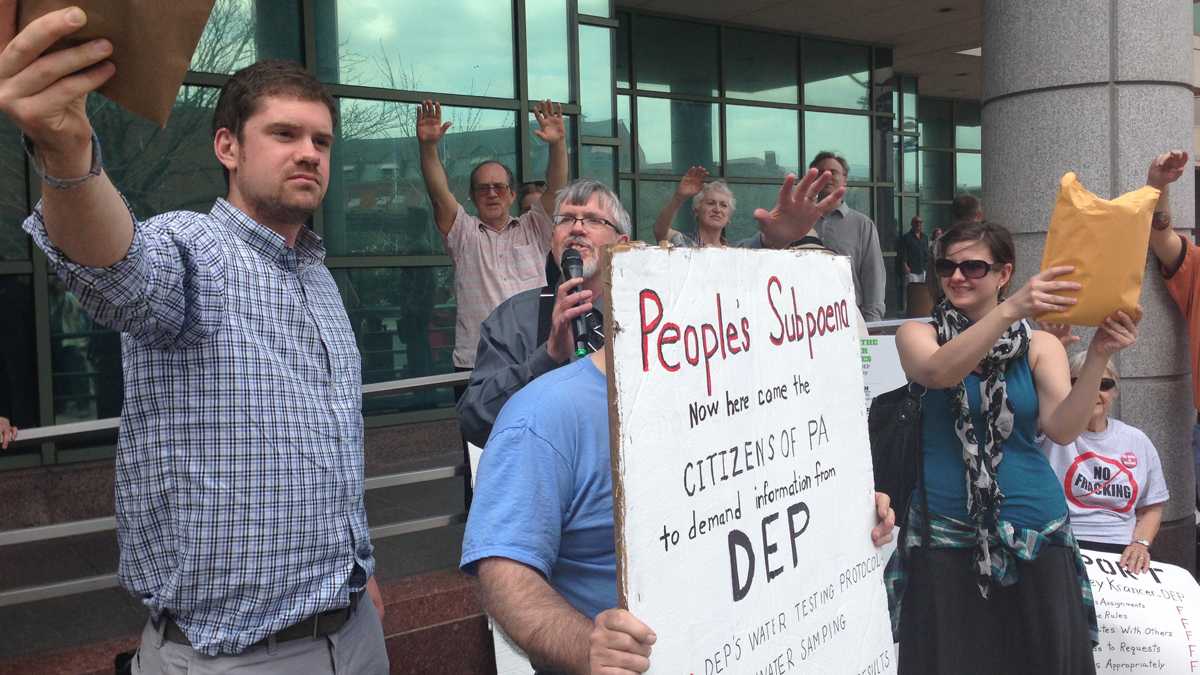Audit faults DEP response to gas drilling water complaints
Listen
Protesters are shown outside of the DEP's Harrisburg headquarters in April 2013. Auditors criticize the department for communicating poorly with citizens who complained about water issues related to gas development. (Marie Cusick/StateImpact Pennsylvania)
Pennsylvania’s Department of Environmental Protection failed to adequately track and respond to public complaints about water quality related to natural gas development, according to a report released Tuesday by the state auditor general’s office.
Auditors found the department lacking in eight key areas — citing it for sloppy record-keeping, lax oversight of drilling waste and gas well inspections, and poor communication with people who complained gas drilling contaminated their water. In some cases, auditors say, it took months or even years for the DEP to log complaints into its internal tracking system.
The report covers DEP operations in the first few years of the gas boom — from January 2009 through December 2012. It’s the result of a campaign pledge by Auditor General Eugene DePasquale, a Democrat and former DEP staffer, who vowed to look into how the department handles water complaints related to gas drilling.
DePasquale says the state wasn’t prepared for the gas boom.
“DEP is underfunded, understaffed and inconsistent in how it approaches shale gas development,” DePasquale said at a press conference. “It’s like firefighters trying to put out a five-alarm fire with a 20-foot garden hose.”
The DEP disputes all of the audit’s eight findings, but does agree with most of the report’s 29 recommendations for improvement. In a lengthy response, the agency says the audit findings are outdated because it has improved and updated many of its procedures.
“Most of this audit reflects how our oil and gas program formerly operated, not how the program currently functions,” said DEP Secretary Chris Abruzzo in a statement. “We also agree with many of the helpful recommendations in the auditor general’s report.”
As to the accuracy of its record-keeping, the DEP says auditors tried to use its electronic databases to ask questions they were never designed to answer, and, in some cases, the auditing staff failed to understand how those databases work.
The auditors disagree and say, early on in the process, the agency blocked access to records and, in some cases, took months to provide basic data-sets.
Environmental groups praised the audit and say the DEP needs more funding.
“When our citizens have greater access to information about kennel inspections and restaurant inspections than they do natural gas well inspections, we have a problem.” said John Norbeck, vice president of PennFuture.
The gas industry trade group, the Marcellus Shale Coalition, says its member companies are willing to pay higher well permit fees so DEP can hire more inspectors.
“It’s clear that Pennsylvania’s regulatory regime is effectively meeting its objectives of protecting our environment and making certain that shale’s broad benefits are fully realized,” said MSC spokesman Patrick Creighton in an email.
Patrick Henderson, who serves as Gov. Tom Corbett’s Energy Secretary, says the DEP has been a national leader in regulating shale gas, and believes DePasquale’s findings raise questions about whether the audit was politically motivated.
“The auditor general went to great pains to say he’s not maligning the work ethic, character, and integrity of the employees of DEP, yet in his findings I don’t see anything that reflects positively on the work they’re doing,” Henderson said.
For the first time, the DEP released its accounting of how many water supplies in the state have been adversely impacted by oil and gas operations – a total of 209 since the end of 2007.
WHYY is your source for fact-based, in-depth journalism and information. As a nonprofit organization, we rely on financial support from readers like you. Please give today.

